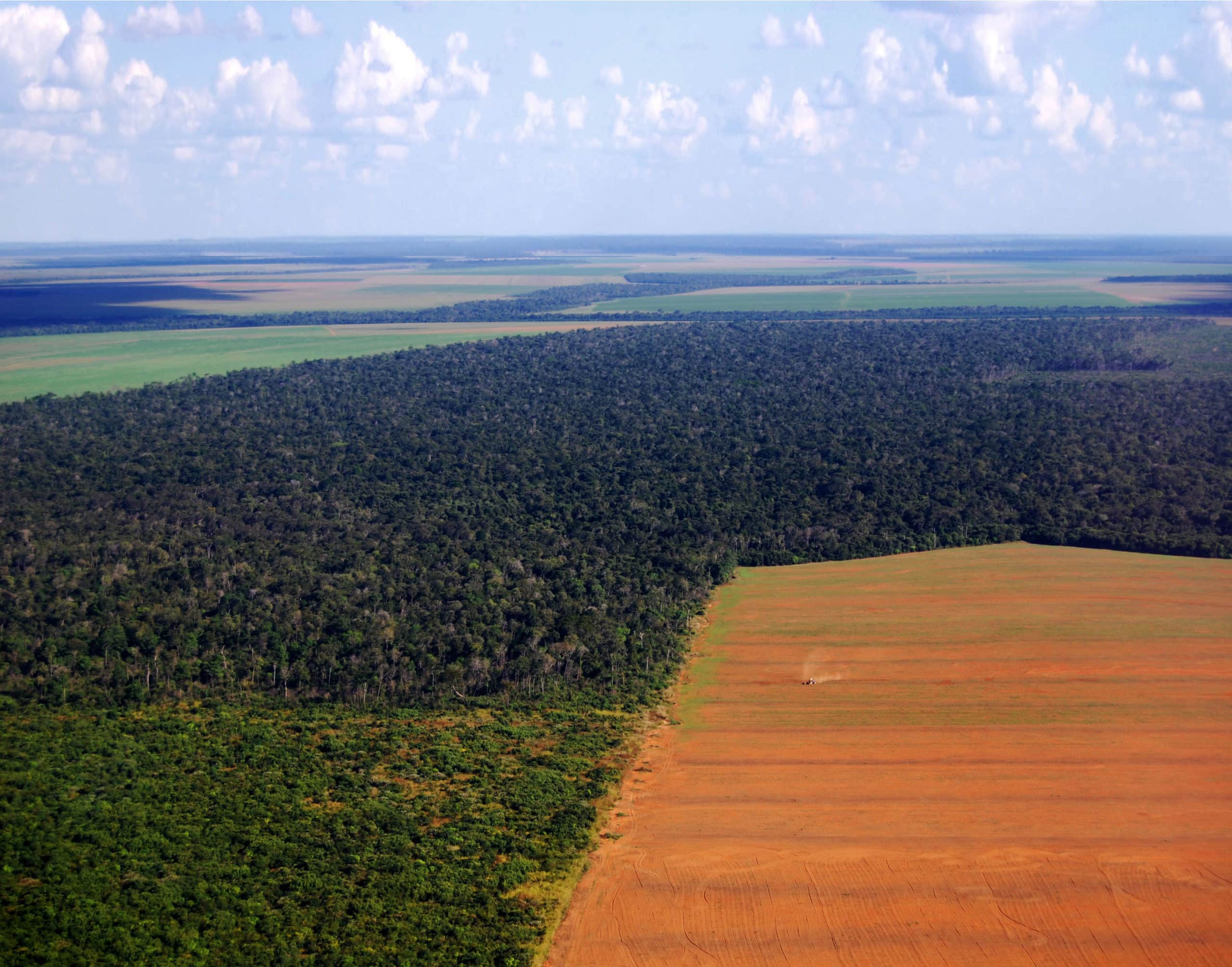
The campaign to end public financing of industrial livestock operations
In late June 2022, the International Finance Corporation (IFC) granted a $200M loan to agribusiness giant Louis Dreyfus Company (LDC) for purchases of soy and corn — mostly headed for climate-destroying factory farms — from multi-thousand-hectare industrial operations located in heavily deforested regions of the Brazilian Cerrado.
A biodiversity-rich biome that is home to 5% of the world’s animals and plants and 216 Indigenous territories, the Cerrado has already lost half its native vegetation to cattle ranches and highly mechanized, multi-thousand-hectare industrial farming operations like those the IFC’s funding will support. These chemical-intensive operations generate numerous negative environmental and human health impacts, including: significant GHG emissions, degradation of soil and freshwater resources, biodiversity loss, nutrient pollution and pollution-related human diseases, including pesticide-related illness and death among children. The proliferation of these mega-farms has also resulted in the disenfranchisement of smallholder farmers and land conflicts with local communities. In the Cerrado and elsewhere, LDC’s operations have been linked to deforestation, land grabbing and forced migration.
Friends of the Earth together with other members of the Stop Financing Factory Farming (SFFF) campaign and 230+ civil society organizations (CSOs) from around the world fought to block the taxpayer-funded investment, which we argued violated IFC’s own environmental and social safeguards and the bank’s commitment to align its investments with the Paris Agreement and UN Sustainable Development Goals (SDGs). We also pointed out that the loan was at odds with Biden’s International Climate Finance Plan and challenged the notion that a $49B company with $3.5B in untapped public and private financing could be worthy of an additional $200M in taxpayer-funded support.
Addressing our concerns, IFC claimed that the $200M investment was designed to promote “sustainable development” by supporting LDC’s “ambitions towards zero-deforestation in its supply chain.” The bank also noted the investment’s “potential to demonstrate to other companies and regulators the feasibility of full [supply chain] traceability” and claimed that LDC’s 2025 no-deforestation commitment placed it among the industry’s sustainability “leaders”.
The SFFF campaign and global allies challenged these claims, pointing out that deforestation was only one of industrial monocropping’s myriad devastating E&S impacts and that IFC had failed to demonstrate whether or to what extent its $200M investment could reduce it. We also pointed out that LDC’s 2025 zero deforestation cut-off date actually made the company a sustainability laggard, and “the further entrenchment of industrial monocropping by LDC in the Cerrado and elsewhere [was] inconsistent with any coherent notion of sustainable development.” Our correspondence also noted that the rapid approval of the LDC loan was “part of a troubling trend of fast-tracking environmentally and socially damaging agribusiness projects.” Highlighted examples included the Mavin pig breeding and processing operation in Vietnam and the Pronaca pig and poultry operation in Ecuador.
During the weeks leading up to the vote, the SFFF campaign and allies continued to engage IFC management and its government shareholders (Board of Executive Directors) on these issues through a series of written and real-time communications. Although the loan was ultimately approved, the Board of Directors made a significant request of IFC: they asked that the bank present their full agribusiness portfolio to facilitate the board’s comprehensive review of IFC’s investments in the sector.
Looking ahead to this review, Friends of the Earth and more than 120 global CSOs urged the Board to “reject the notion that investments in wealthy mega-corporations involved in climate-destructive industrial livestock and/or feed production could be “environmentally sustainable & socially inclusive.” We cited numerous UN and scientific studies that have encouraged reductions in monoculture feed and industrial livestock production and a shift in agricultural methods to meet essential climate targets, enhance climate resiliency, and feed a growing population. We also pointed out that a shift away from the highly centralized, extractive, and inefficient industrial food supply chain is supported by the World Bank Group’s own guidance, which has emphasized the importance of “incentivis[ing] more sustainable practices—properly valuing ecosystem services and mobilizing resources, knowledge and technology for smallholders, indigenous peoples and other producers to support a more equitable way of producing and consuming food.”
Together with partners on the ground in Brazil, Friends of the Earth and the SFFF campaign are continuing to monitor LDC’s activities in the Cerrado and demanding accountability from IFC for the harmful impacts of its lending on the environment and local communities. We are also continuing to engage IFC in frank conversations about the role of the bank’s current agribusiness investments in entrenching corporate control of the environmentally and socially destructive industrial food system. Similar to the campaign’s engagement with other development finance institutions, our goal in engaging IFC is to encourage the bank to shift its agricultural lending toward diversified and climate-resilient food systems that are most likely to promote food security among the populations whose interests public financing should protect.
Learn more about the Stop Financing Factory Farming campaign!
Media Hits
- Taggespiegel, “Brazil: Controversial IFC loan to agricultural trader”
- Reporter Brasil, “Soy produced by company involved in a land conflict in Matopiba supplies the industry’s multinationals”
- Business & Human Rights Resource Centre, “Brazil: IFC grants $200 million loan to Louis Dreyfus Company for soy and corn production in Cerrado”
- Brettonwoods Project, “IFC approves loan to industrial agriculture producer in Brazil despite pleas for protection of sensitive grassland biome”
Related Posts
Ways to Support Our Work

Read Latest News
Stay informed and inspired. Read our latest press releases to see how we’re making a difference for the planet.

See Our Impact
See the real wins your support made possible. Read about the campaign wins we’ve fought for and won together.

Donate Today
Help power change. It takes support from environmental champions like you to build a more healthy and just world.